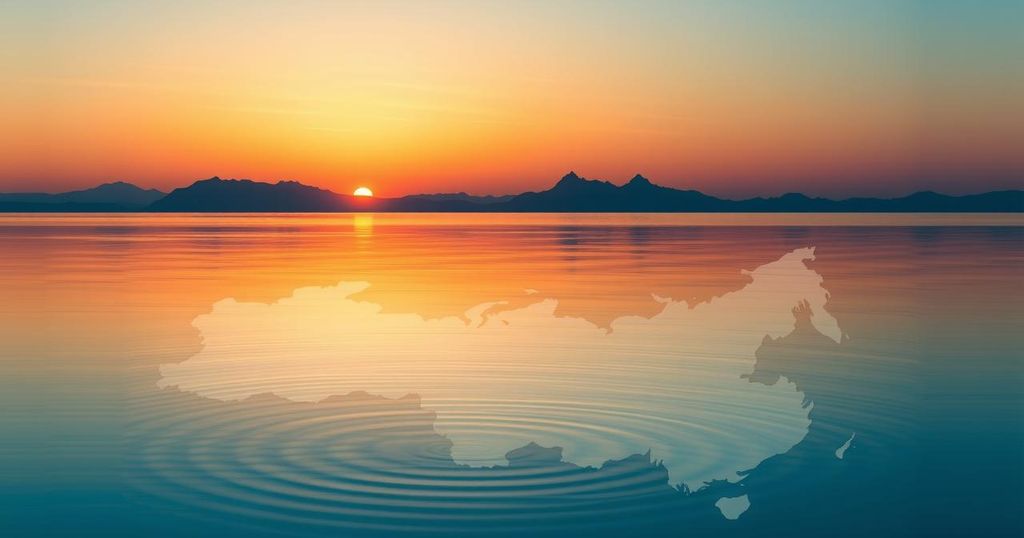Maduro’s Third Term: Escalating Tensions with Guyana Amidst International Condemnation

On January 10, 2025, Nicolás Maduro began his third presidential term amid protests and claims of electoral fraud. His administration faces international isolation, particularly from Latin American leaders and the U.S., which has charged him with narco-terrorism. In a troubling turn, Maduro has intensified territorial claims over the Essequibo region of Guyana, escalating military activity while disregarding diplomatic agreements with neighboring countries.
On January 10, 2025, Nicolás Maduro was inaugurated for a third six-year term as President of Venezuela, amidst a significant show of military presence and protests from opposition groups. The celebratory atmosphere in the Legislative Palace starkly contrasted with the angry demonstrations outside, where thousands rallied against his repressive regime. Pro-Maduro supporters, known as Chavistas, were also present, emphasizing the deeply divided political landscape in the country.
The contentious Presidential elections held on July 28, 2024, saw Maduro claiming victory despite evidence of widespread fraud. His opposition, represented by Edmundo Gonzalez after the charismatic Maria Corina Machado was barred from running, indicated that Maduro lost by a substantial margin. This has ignited massive protests demanding the truthful disclosure of election results, leading to a growing international rejection of Maduro’s legitimacy from leaders such as Brazil’s President Lula and Colombia’s Gustavo Petro.
The United States has escalated its hostility toward Maduro, issuing a $25 million reward for his capture due to charges of “narco-terrorism.” This comes amid a backdrop of significant drug trafficking linked to his regime, with the Biden administration affirming support for Gonzalez as the legitimate president. Nonetheless, Maduro continues to draw on support from nations like Cuba and Nicaragua, which highlights his increasing isolation in Latin America.
Maduro’s administration is reportedly perturbed by the potential return of Donald Trump, who may push for sanctions and military action against Venezuela. While Chevron’s operations in the country afford Maduro some economic security, he seeks to appease Trump by offering a pathway for undocumented Venezuelan migrants, which aligns with Trump’s deportation agenda. Despite this, Maduro’s popularity remains fragile.
Turning to foreign policy, Maduro has opted to intensify tensions regarding the territorial claims on Guyana, particularly over the mineral-rich Essequibo region. Prior to his inauguration, he announced elections for a governor in the disputed area, while Venezuelan maps refer to it as “Zona Reclamacion.” Concurrently, Venezuelan military forces are facilitating troop movements into the region, disregarding diplomatic agreements established with Guyana and the International Court of Justice.
These provocative actions raise concerns about Maduro’s intentions regarding Guyana, especially as they contravene an international call for de-escalation. The environment suggests a propensity towards armed conflict in lieu of peaceful negotiations. Advocacy for public awareness and cooperation with indigenous communities in Guyana is essential to safeguard their cultural and socio-economic interests amidst the ongoing dispute.
The tensions between Venezuela and Guyana stem from longstanding territorial disputes, largely over the resource-rich Essequibo region. Maduro’s government has employed nationalistic rhetoric to bolster claims to this territory, instigating military activity and regional instability. These developments occur against a backdrop of internal political strife and international condemnation, complicating diplomatic relations and fueling calls for intervention among global leaders.
Nicolás Maduro’s inauguration for a third term is overshadowed by allegations of election fraud and the discontent of a sizable segment of the population. His government’s increased militarization in the border dispute with Guyana, juxtaposed with international rejection and accusations from the U.S., suggests that Maduro may continue to pursue aggressive nationalist policies. The situation warrants close monitoring, particularly regarding human rights and regional stability, as the prospect of armed conflict looms in the wake of these provocative actions.
Original Source: indepthnews.net








